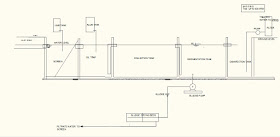PRIMARY
EFFLUENT TREATMENT PLANT (PETP)
PARAMETERS
OF TREATED WATER for HOTELS , HOSPITALS and other industries currently accepted
by Pollution Control Board of Assam. (PCBA)
The
parameters of the treated effluent water will be as under meeting norms of Pollution control
Board (PCBA) .
pH Between 5.5 to 9
TSS (Total suspended solid below 150 mg/liter
BOD( Biological oxygen demand) less than 30 mg/liter
COD(Chemical oxygen demand) less than 250 mg/liter
Oil & grease less than 10 mg/liter
pH Between 5.5 to 9
TSS (Total suspended solid below 150 mg/liter
BOD( Biological oxygen demand) less than 30 mg/liter
COD(Chemical oxygen demand) less than 250 mg/liter
Oil & grease less than 10 mg/liter
IF WASTE WATER FROM HOTEL, HOSPITAL EXCEEDS
THE ABOVE VALUE, ONE PETP IS TO BE INSTALLED FOR TREATING WASTE WATER AND BRING
IT WITHIN LIMITS MENTIONED ABOVE.
Our Consultancy & Supervision scope:
We offer our work on consultancy basis for the Hotels
,hospitals, restaurants, wedding hall, ccar service station, tea garden and
other industries. . All the civil & execution work will be done
by the respective Hotel , under our
guidance from initial survey to the final report submission to the Pollution
Control Board of Assam (PCBA).
1.Preparation
of drawing as per site condition for each
location of hotels , it’s size , their
complexity and need of the hotel
. Thus there is no common solution for all hotels if Customized concept
is adopted , So will provide customized system plant for each
site. Also, at various sites there are exiting septic tanks and other tanks
,pipes etc which can be adjusted in our proposed system which will reduce
construction cost.
2 . We shall Provide a Flow
Chart & project report for
submission to the PCBA
3.We will supervise the progress
of the civil works during construction time of the ETP.
4.We will provide you a
list of dealers from where you can buy
the pump , blower and chemicals.
5..We will train your staff
for first 3 days how to run the plant & provide a maintenance manual for
the plant
6. We will provide a first water test report to be submitted to pollution board
7. We shall help in filling of the Documents to be submitted to the
PCBA . All the legal fees & dues needs to be cleared by the client . The
extra cost for Consent to operate or NOC is not included in the Consultancy
DATA
REQUIRED:
a)Quantity of waste
water generated liter per day
b) Waste Water test report .
.
TREATMENT METHOD OF PETP:
Chemical pre treatment followed by filtration
Flow
Chart of PETP:
IN-Screen—Oil Trap---Collection
Tank---Primary Sedimentation--— ------Disinfection Tank—Pump---Filter ----Out
to drain
Details of different units of the proposed system
A)CHEMICAL
TREATMENT OF WASTE WATER IN PETP
a)
Screen :Waste water will flow through these drains
by gravity flow from the inlet manhole. To remove large floating objects , bar
screens and oil traps are provided inside the incoming drain itself .
b)
Collection tank: All waste water will be collected
here .Lime and Alum will be added here and mixed by air bubbling from a air blower..Waste
water will flow by gravity to the next unit.
c)
Primary Sedimentation tank(PST): The chemical
sludge will be settled here. Waste water will flow by gravity to the next unit.
Sludge is removed by sludge pump to sludge drying beds.
d)Disinfection tank : Disinfection is done here with bleaching powder to
remove colour, bactaria and other
contaminants and than pumped to the pressure
sand filter and finally released to drain.





